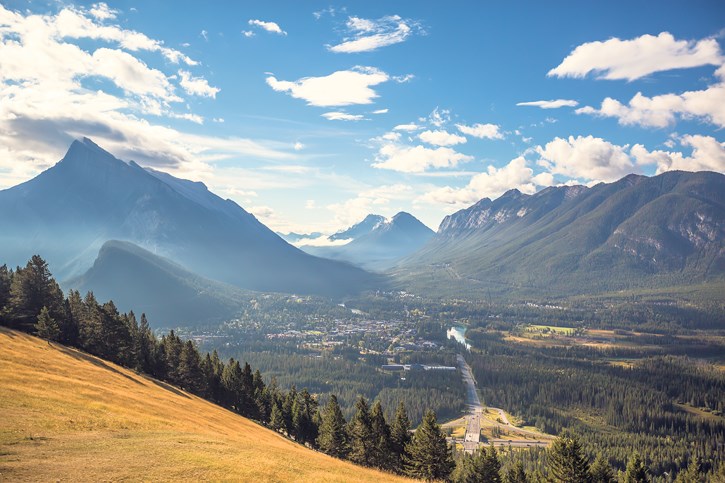BANFF – The 2023 national roundtable on the work of Parks Canada is being held this month and next.
A representative from Environment and Climate Change as well as members of the executive branch of Parks Canada were at a consultation session at the Banff Springs Hotel on Monday (Jan. 23), with specific focus on Parks Canada’s role in the growth and recovery of tourism following the COVID-19 pandemic.
Officials say the national roundtable, to be held across Canada from Jan. 30 to Feb. 13, aims to consider views on the progress the federal agency has made in fulfilling its mandate and to discuss the future of national historic sites, national parks and national marine conservation areas.
“The 2023 minister’s roundtable on Parks Canada offers Canadians the opportunity to share their perspectives on important questions facing national heritage places in Canada,” said Steven Guilbeault, minister of Environment and Climate Change in a news release. “I am looking forward to hearing from you and I encourage everyone to participate in the consultation.”
The 2023 minister’s roundtable focuses on five themes. From Jan. 30-Feb 13, people will be invited to share views on the topics through an online consultation platform, over social media and in stakeholder engagement sessions. Check out www.letstalkparkscanada.ca to find out how to participate.
The five topics include strengthening accessibility; Indigenous stewardship and advancing Indigenous leadership in natural and cultural heritage conservation; ecological corridors; Parks Canada’s role in growth and recovery of tourism; and greening Parks Canada operations to achieve net zero emissions.
The minister must respond to the recommendations that come out of the consultations within 180 days.
For the Jan. 23 session in Banff, local politicians and bureaucrats as well as Indigenous partners and tourism, business and environmental organizations among others were invited to attend.
There were two key facilitated discussions, including how Parks Canada can further its support and partner with the tourism industry while it delivers its important mandate to protect and share national historic sites, parks and marine conservation areas. The second discussion was on how can Parks Canada further its efforts to work closely with Indigenous peoples to foster greater connection to protected places and also greater opportunities for Indigenous people and enterprises?
Takeaways from the roundtable for Banff Mayor Corrie DiManno included the need for ongoing collaboration and communication with partners, operators, and Indigenous communities.
She noted Banff and Lake Louise Hospitality Association's (BLLHA) pitched the idea of a tourism advisory group as a way to strengthen Parks Canada’s support of the tourism industry.
“I think it’s a great idea and I hope Parks Canada will consider implementing it,” she said.
DiManno said they were honoured to be in the company of several Indigenous leaders and chiefs at the roundtable.
“I learned a lot from listening to their perspectives and ideas on how we can do a better job of supporting Indigenous Tourism so that they can share their stories – and the stories of this special land – with visitors,” she said.
“While not a new topic to me, we did hear an emphasis on the current labour shortage and how that’s exacerbated by the lack of housing in Banff National Park.”
Wanda Bogdane, BLLHA executive director, said while interested in exploring all five themes, the organization is particularly interested in discussing Parks Canada’s role in the recovery and growth of Canada’s tourism sector.
She said the group is also keen to talk about how Parks Canada can better take part as a tourism destination partner on the path to a more sustainable future,
“For a number of years, BLLHA has been calling partners to the table to discuss destination-wide measures and commitments on sustainability and climate action, so we are pleased to see this emerging more among Parks’ priorities,” said Bogdane.
“The theme stood out in Parks Canada’s recent management plan for Banff National Park, and given the gravity of the work to be done, it’s a welcomed topic for the roundtable dialogue.”
Bow Valley Naturalists (BVN) said they are disappointed the Jan. 23 Banff session was focused solely on Parks Canada’s role in tourism.
Reg Bunyan, a member of BVN’s board of directors and past president, said Banff is Canada’s most visited and developed national park, and while it reaps the economic benefits of tourism, that same heavy tourism and development pressure impacts community culture, greenhouse gas emissions and has widespread ecosystem impacts.
“The Bow Valley Naturalists have repeatedly expressed the concern that the entire Bow Valley is at a tipping point where it’s pointless to have a single topic discussion without taking into consideration ecological issues,” he said.
“Recommendations or opinions about mass transit, intercept parking, tourism or development are about as useful as beer hall talk without the early consideration of potential impacts or ecological limitations. That doesn’t mean we have to be paralyzed by ecological limitations, but without that focus as defined in the National Parks Act, these discussions or recommendations are likely to not be productive.”
While acknowledging the tourism sector is clearly an important player in any discussion about the future of Banff National Park, Bunyan said BVN believes the minister’s roundtable session topic was entirely wrong.
“We, including the tourism sector, should all be focused on how we can collectively work together within existing ecological constraints, which ultimately requires Parks Canada to shift its focus from partnership mode to restoring a leadership mode that is consistent with the legislated mandate,” he said.




